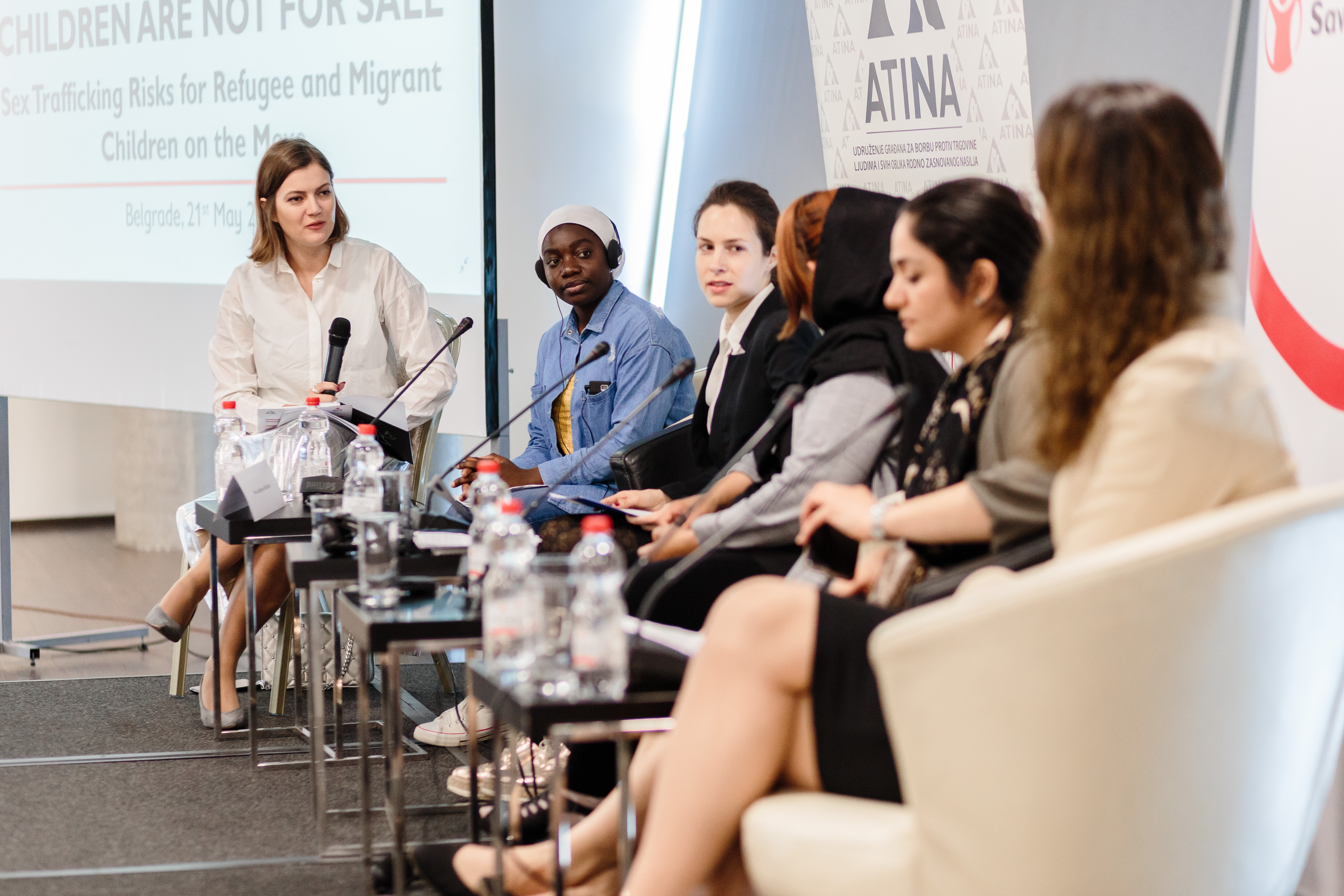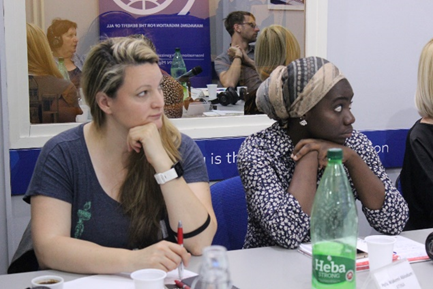December 2020
By Jelena Hrnjak with support of Jelena Ribac, NGO ATINA & IOM Belgrade, Serbia
In the last five years Serbia has experienced large-scale and mixed migration flows, i.e. complex population movements including refugees, asylum seekers, economic migrants unaccompanied minors, environmental migrants, smuggled persons, victims of trafficking and stranded migrants (IOM). More than one million men, women and children from the Middle East, Africa and Asia passed through Serbia since 2015. Many still undertake dangerous journeys to escape war, persecution, poor living conditions and overall hardship for the hope in a safe and better future in Western Europe. At the end of 2020 there are around 7000 people on any given day in the reception centers in Serbia. At least 15% of them are women and children which find themselves in situations of multifaceted risks and vulnerabilities. Being involved from the very outset of the crises, NGO ATINA from Belgrade, partner to International Organization for Migration (IOM), tries to answer to some of the questions linked to vulnerabilities of women migrants transiting the Balkans on their way to Western Europe.
How to respond to gender specific drivers of migration as well as needs and vulnerabilities of female and male migrants and forcibly displaced populations?
In the refugee crisis that emerged in the Western Balkans in 2015, organization ATINA's team, an association specialized in combatting human trafficking and all forms of gender-based violence, met many brave women who wanted a different future for themselves. Many of the women we met cited escaping violence as the main motive and driver for migration. This form of violence they have experienced is systemic and constant, physical and psychological, economic conditioning, helplessness, as they were forbidden to become educated, go to school, choose a partner, speak in public.
Are women and men affected in differing ways throughout the migration journey and are there specifically gendered roles associated with that experience?
Women are at greater risk of violence and exploitation than men. Many women became refugees and migrants because they were at risk, or because they`ve already survived violence or exploitation in their countries of origin. Furthermore, when travelling alone, women are more often accompanied by their children than men, which in itself increases the risks of unsafe journey, violence and exploitation en route. Most women are economically and financially dependent on their husbands or other male members of their family, which further contributes to their vulnerability.
Gendered roles of women remain dominant, women are responsible for all the needs of their families during the journey; while men generally remain aloof, women must see to the needs of everyone around them. Leaving the country of origin does not change the patriarchal norms they live in, and does not break this matrix. Liberation must come from within, and that is why it is important to deconstruct those positions in a culturally acceptable manner. That is why we must insist on the obligatory space for decision-making.
How to ensure that female and male migrants, refugees and IDPs have equal access to services and economic and productive resources including durable solutions?
Both women and men migrants and refugees have to be actively included in creating and delivering support services, so that these services adequately respond to their particular needs. Each refugee and migrant shall, first of all, be understood and treated individually, and only then as a member of a family, part of a community, etc.
How to empower women migrants and forcibly displaced people in participating in decision making in general and policy discussions related to migration and forced displacement in particular.
Migrant women or men can be empowered through peer-support groups which can firstly be utilized as a basis to secure their feeling of safety, to exchange experience and contribute to their psycho-social well-being. Later these groups can represent a good platform for advocating different initiatives and measures - legal, political, economic. In designing and maintaining the empowerment programs and activities for refugees and migrants, the local community must be included, as in this way the social distance between the two communities will decrease, thus strengthening the prospect of integration.
With the support of the Swiss State Secretariat for Migration (SEM) and the International Organization for Migration (IOM), NGO ATINA facilitated the work of a peer-support group which led to the establishment of an Advocacy leaders` group of migrant women residing in Serbia. Within its mandate, the group advocates for two overall goals. First is to address as many professionals in Serbia as possible to actively advocate for changes in protection policies related to the rights of women on the move. The Group maintains regular meetings with decision-makers, on the local but as well on the national level (ministries, local administration, UN agencies, NGOs), to support the institutions to understand better the position of migrant women, refugees, and asylum seekers, including cultures they are coming from. The advocacy group long-term goal is to become a mandatory and unavoidable (f)actor influencing decision-making processes in the asylum and social protection system.
For ATINA, the main goal from the very start was to provide these women with an alternative - to help them live their lives outside of enclaves, breathe freely, feel safe, and dignified. Most of these women initially expressed intention to seek asylum in Serbia, but the majority nevertheless left Serbia, seeking refuge in another country. Still, after the amendment of the Law on Asylum in Serbia in 2018, some of these women managed to obtain asylum in Serbia based on the fact that they were identified as victims of human trafficking and gender-based violence and entered the integration process.
Members of the Advocacy Group are very active in making proposals and recommendations for the amendments to the minimum standards for services in Serbia. The groups participate in the preparation of reports that ATINA prepares for the Grevio and CEDAW Committees. Group members spoke publicly at conferences organized by the WIDE + European Feminist Network, followed by webinars organized by the Rockefeller Foundation as part of the movement "Black Lives Matter." There are currently 5 members in the group. The group's plan is to develop projects to empower other migrant women using the peer to peer methodology. Given that the organization ATINA runs a social inclusion programme and shelter for migrant women and children who have survived gender-based violence, members of the Advocacy Group very often help newcomers and support them in overcoming trauma.
Kimi, a young migrant woman from Nigeria involved in the peer support group activities clearly underlined the essence: “We need to include migrant women and girls in deciding and designing assistance and protection services. The journeys we are passing are far too dangerous in many ways. Migrant women, may they be with families or single, need empowerment to know that they can have a say and start to decide for themselves – at least on the little things, for a start."

Photo credit: Dario Maric, dariomaric.tumblr.com
| 
Photo credit: Media Center, Nis, Serbia
|
NGO ATINA's program “For and with Refugee and Migrant Women in Serbia": Implemented with the support of Swiss State Secretariat for Migration (SEM) and IOM Mission in Belgrade in 2019. The program enabled peer and psychosocial support for 107 women and girls. It addressed Sexual and Gender Based Violence issues, prevention of human trafficking, labor exploitation, reproductive health, education and other topics relevant to migrant women.
Switzerland and Serbia signed a Migration Partnership Memorandum of Understanding in 2009 that is an instrument of bilateral cooperation that offers possibility to find solution to the country's specific challenges posed by migration. The new Swiss Migration Strategic Framework for the Western Balkan 2020-2023 provides guidance for future cooperation in migration field.
Links:
More on the SEM funded project with IOM and partner NGOs can be found here:
https://serbia.iom.int/node/536
https://serbia.iom.int/sites/default/files/Results%20of%20CSO's%20Programs%20for%20Social%20Protection%20and%20Support.pdf
https://serbia.iom.int/node/431
More on NGO ATINA can be found here:
http://www.ATINA.org.rs/en
